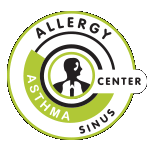WHAT WE TREAT
Determining the cause of your worrisome fatigue, chronic infections, or constant headaches can be daunting. But if you live in the South or Southeast, one major reason for your symptoms looms above all others: allergies. Whether you know you have allergies or asthma – or just suspect it – trust the board-certified, specialty trained providers at The Allergy, Asthma & Sinus Center. What we treat is in our name, but we're so much more.
What we treat:
Why should I see a specialist?
As with most health issues, when allergic, asthmatic and sinus symptoms are left undiagnosed and untreated, they tend to worsen and develop into conditions that are much more severe than a sniffle or cough. Let's talk specifically about allergies. Allergies can be the underlying cause of frequent sinus, ear, and upper and lower respiratory tract infections. Untreated allergies can even exacerbate or cause asthma, resulting in 80 percent of all asthma cases in children and half of all cases in adults.
The symptoms we treat at The Allergy, Asthma & Sinus Center can start small, a runny nose or nagging sinus pressure. But if ignored, these signs can result in missed work, school, and play, and can result in much more serious, chronic conditions. Take back your life and stop your symptoms in their tracks! Request an appointment with one of our board-certified allergists today, and notice how much better it is to breathe deeply, think clearly, and play freely again.
Finding relief.
Our two main methods of treatment involve immunotherapy and avoidance. Follow the links below to learn more about both.
What should I expect when I see an allergist?
Since some drugs may interfere with the results of your tests, you may be asked to stop taking antihistamines or other decongestant drugs. (Getting the most accurate results from your initial assessment is very important.) If you have any questions regarding medication you may be taking, please contact one of our nurses.
Your allergist will conduct a patient history, an analysis of your symptoms, a relevant physical exam and a thorough environmental evaluation. He or she may also conduct a skin test / allergy test to determine your specific allergens. This skin test is effective to evaluate both inhalant allergens and food allergens. Learn more about what’s involved in a skin test.
Once the allergist identifies the cause of your symptoms, a treatment plan can be recommended. Your treatment plan may include avoidance, medications, and/or immunotherapy.
What about an ENT?
As with any medical specialty, the differences between an allergist and an ear, nose, and throat specialist is in their training. While one field centers around the diagnosis and treatment of the immune system, the other addresses structural issues and focuses on the intricacies of surgery. Learn more about which specialist is best for you by clicking the link below.
TRUST THE EXPERTS
All physicians board-certified in allergy and immunology

All Rights Reserved | The Allergy, Asthma & Sinus Center
